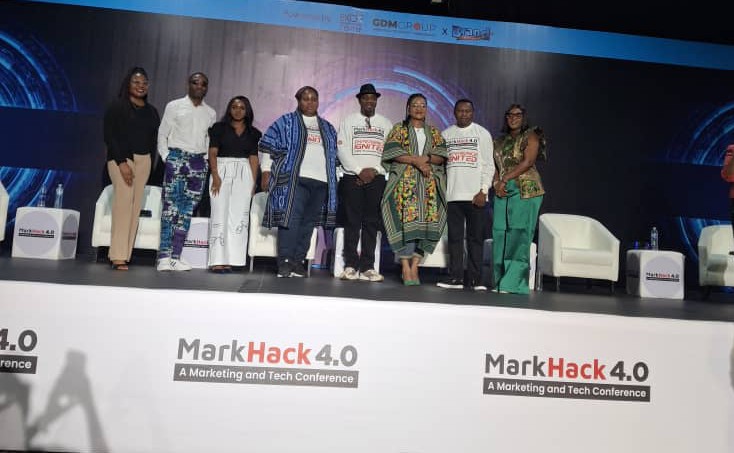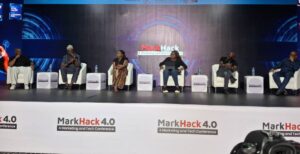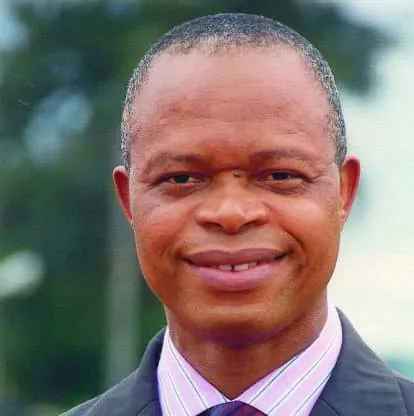The atmosphere at the MarkHack 4.0 series was electric, alive with anticipation as attendees settled into their seats, phones silenced, and eyes fixed intently on the stage.
The hum of excitement echoed through the room, a shared sense of purpose uniting marketers, innovators, and thought leaders gathered to explore the evolving intersection of technology and retail in Africa.
It was not just another conference; it was a convergence of minds ready to shape the future, an immersive experience where physical presence met digital innovation in seamless harmony.
Victor Afolabi, the convener of the event, set the tone with a compelling opening address that welcomed participants into a day of deep learning and collaboration.
The martech enthusiast framed the event as a vital platform to bridge
gaps in understanding and practice, especially between physical and digital retail realms, setting the stage for a conversation on how these forces must integrate to meet the evolving needs of African consumers.
The fourth edition of MarkHack, the leading marketing and technology event in Nigeria, has taken a bold step forward in shaping the future of consumer engagement and industry innovation. At the heart of this year’s theme, Experience Ignited,” lies a powerful drive to elevate consumer experiences by harnessing cutting-edge technology.
The Convener and CEO of GDM Group while reflecting on the strides made so far noted that,
“We are at MarkHack 4.0 of the ecosystem,:Experience ignited” is about fueling the consumer journey but not just at a basic level, It is about dialing consumer engagement up a notch higher across the myriad of channels where consumers are constantly bombarded with information.”
MARKHACK’s mission is clear: to position marketing and technology at the intersection where disruptive innovation catalyzes how brands and consumers connect in a digital-first world.
Afolabi stressed that this challenge extends beyond Nigeria’s borders, as global developments like AI and machine learning rapidly reshape industries.
“The creative economy is evolving, powered by new technologies , and Nigeria must lead these conversations and innovations.”
He excitedly revealed the extension of the event which has evolved to award celebration.
“This year also marks the inaugural introduction of the Nigerian Market Tech Awards. MarkHack a platform designed to recognize outstanding achievements by startups and established players leveraging data, innovation, and technology to reshape marketing practices.
From over 150 startups, a rigorous selection process by expert jurors has narrowed the field to ten finalists who have undergone mentorship and will compete for \$20,000 in prize money, alongside three months of incubation and acceleration support.”
The industry leader emphasized the importance of ongoing support beyond awarding winnings:
“Our accelerator program is crucial. It provides mentorship, resources like AWS credits, laptops, funding, and a team environment to help startups refine their products and scale sustainably. Many previous winners have grown significantly, raising funds and returning to support the platform that helped launch them.”
The evolution of MarkHack itself mirrors the dynamism of the Nigerian marketing ecosystem. Initially targeting individuals, the event has shifted focus toward existing startups at ideation or early scaling stages, fostering stronger chemistry and collaboration. “We believe marketing should come from within, from our 200 million people defining culture and creativity in music, fashion, and more , and not be dictated by external forces.”
He added that beyond innovation, MarkHack champions localization to reduce reliance on costly foreign technologies and platforms. “We’re spending resources engaging our own people on global platforms, but technology is expensive, and we need to start thinking local.”
For Afolabi, MarkHack represents a form of giving back, investing in the next generation of marketers and tech innovators to build the future.
“After two decades practicing marketing, it is time to build the companies that will disrupt and succeed us, so we do not have to struggle with outdated models or external dependencies.”
This year’s event also saw record levels of brand sponsorship and participation, signaling growing industry recognition of MARKHack’s role in Nigeria’s marketing and technology ecosystem. The event’s broad range of speakers and panelists from diverse sectors further enriched discussions on how technology can elevate consumer experiences, foster innovation, and drive sustainable growth.
The marketing guru also announced that the MarkHack 4.0 event would culminate in the inaugural MarkHack Awards, designed to honor trailblazers in digital retail and marketing innovation across Africa. The awards aim to recognize those setting new standards in this fast-evolving market
Following this powerful introduction, Oge Maduagwu, Head of Marketing and Communication at Samsung Electronics West Africa, took the microphone as the lead discussant for the first plenary session. She offered a detailed exploration of “strategies for seamless digital retail experiences,” inviting the audience to rethink retail as a fusion rather than a divide between physical and digital channels.
Her insights placed the consumer experience at the heart of this transformation, highlighting how digital retail is reshaping expectations across Africa’s dynamic market.
Maduagwu explained that digital retail is not simply about presence across multiple channels but about creating a unified commerce model that ensures every customer interaction is seamless and consistent. From online browsing to in-store shopping, the consumer should experience the same level of service, messaging, pricing, and brand identity.
She brought the concept of omni-channel retail to life with examples such as the emerging “click and collect” service, where customers purchase items online and pick them up in-store, bridging convenience with immediacy in a way uniquely suited to African retail environments.
She further illustrated the importance of experiential retail by describing Samsung’s dedicated demo spaces, where customers can test innovative features like advanced low-light photography in real time. This hands-on approach enhances trust and connection, transforming retail from a transaction into an immersive brand experience.
Maduagwu’s presentation also spotlighted the critical role of technology integration. She spoke about the potential of interactive displays enabled by NFC technology, augmented and virtual reality trials, and digital payment solutions such as contactless payments and buy-now-pay-later models. While some of these innovations remain in early stages in Nigeria and other parts of Africa, she emphasized that they represent the future of retail where technology simplifies and enriches consumer interactions.
Central to Maduagwu’s message was the transformative power of data-driven personalization. By aggregating data from all consumer touchpoints, brands can build detailed customer profiles, allowing them to predict needs and deliver personalized marketing that makes each consumer feel individually understood and valued. She also underscored the critical importance of adhering to data privacy laws, citing global standards like GDPR and Nigeria’s NDPR to remind brands that consumer trust depends on responsible data handling.
Adding further depth to the discussion, Sam Okolie, Senior Brand Manager at 7Up, shared his perspective on how digital retail trends are influencing beverage marketing strategies in Nigeria. Okolie emphasized that the rise of digital retail channels offers brands new opportunities to engage consumers in more interactive and personalized ways.
He noted that the beverage industry is increasingly leveraging digital platforms not just for sales but for building brand experiences that resonate deeply with consumers’ lifestyles.
Read also: MARKETING EDGE set to hold 2025 2nd Quarterly Industry Summit
Okolie highlighted 7Up’s recent initiatives that blend digital engagement with physical retail activations, including tailored promotions and immersive events that drive both online and offline consumer interactions.
His contribution reinforced the event’s broader theme: that successful retail strategies in Africa must marry the strengths of digital innovation with the power of tangible, experiential brand moments.
Sam Ukah of Jumia, a key player in Africa’s e-commerce space, added a nuanced perspective on the complexities of operating in Nigeria and South Africa’s markets. Ukah stressed that offline buying behavior must inform digital acquisition and remarketing strategies. “For us at Jumia, buying digital is not just a word; it’s a survival order,” he explained. He emphasized that Nigeria’s ecosystem is complex, and success demands a hybrid approach that leverages both online and offline channels.
Ukah described how Jumia rigorously monitors pricing across digital and physical markets. The company dispatches teams to survey competitors’ prices and top-selling products offline, using this intelligence to shape competitive pricing strategies online.
He underscored the importance of understanding customer profiles, distinguishing between those who complete orders online and those who prefer to pick up items physically. This segmentation allows Jumia to tailor communications and marketing pushes specific to each group.
He also highlighted the vital role of partnerships with suppliers and distributors, noting the economic challenges in Nigeria have tested these relationships. Ukah explained that discrepancies sometimes arise between online prices and those observed offline, prompting dialogue with partners to align strategies. Moreover, Jumia sources products internationally, further complicating the supply chain and pricing dynamics.
Ukah described these efforts as part of a “quantum strategy,” leveraging detailed data points to ensure digital campaigns connect meaningfully with real-world consumer behavior. “We push communications tailored to who is more likely to pick up at a station versus who prefers delivery,” he said, illustrating how integrated data-driven insights bind the online and offline worlds.
Other notable speakers included Kayode Oladapo, CEO of West Africa at Godrej Consumer Products Limited, who offered insights on consumer trends and the effects of digital transformation in fast-moving consumer goods. Jide Sipe, Group Head of Brand Transformation and Digital Marketing at Bank of Industry Limited, spoke on digital marketing’s role in financial inclusion and empowering small businesses. Tosin Adefeko, CEO of AT3 Resources, shared innovative strategies tailored to Africa’s unique market. Chibuike Goodnews and other industry leaders rounded out the panel, contributing diverse perspectives and enriching the dialogue.
MarkHack 4.0 did not merely present ideas but created a shared vision of a retail landscape where digital and physical worlds intersect seamlessly, empowered by data, technology, and human creativity.
As MarkHack continues to grow, it remains a critical platform where marketing experts, technologists, startups, and brands come together to explore solutions tailored for Nigeria’s unique market and cultural context. With the Nigerian Market Tech Awards and accelerator program now fully integrated, MarkHack is setting a foundation for sustained impact and leadership in the intersection of marketing and technology.
Also like: Marketing Edge Magazine







Comment
No comments found.